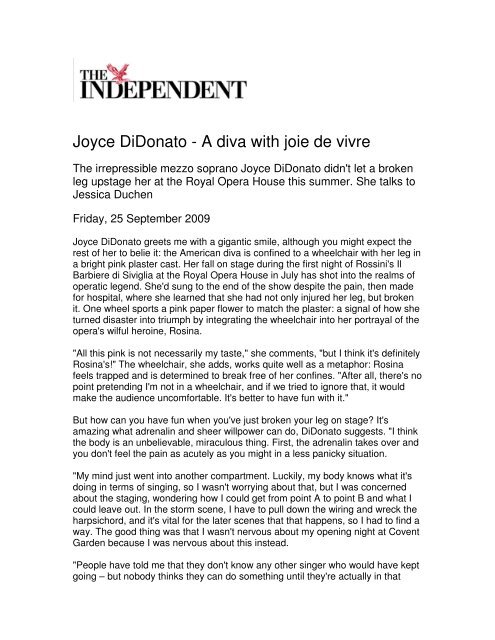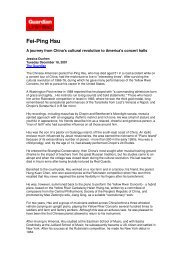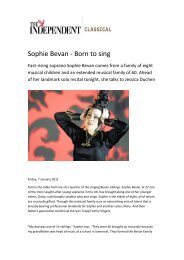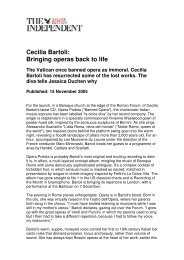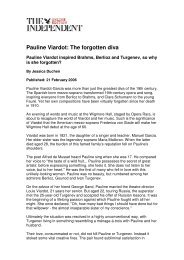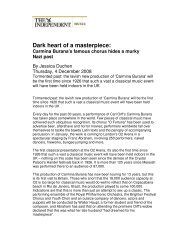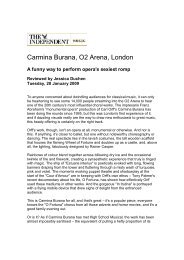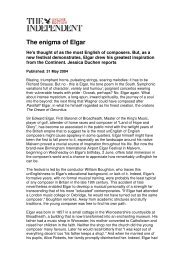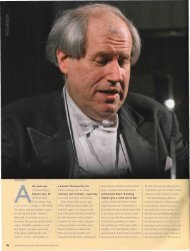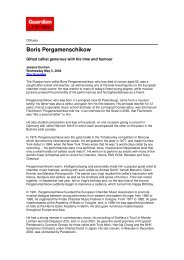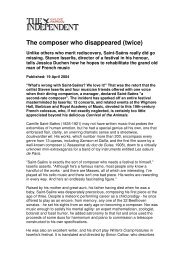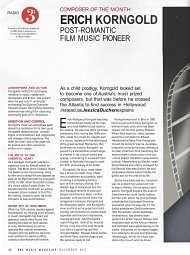Joyce DiDonato - A diva with joie de vivre - Jessica Duchen
Joyce DiDonato - A diva with joie de vivre - Jessica Duchen
Joyce DiDonato - A diva with joie de vivre - Jessica Duchen
Create successful ePaper yourself
Turn your PDF publications into a flip-book with our unique Google optimized e-Paper software.
<strong>Joyce</strong> <strong>DiDonato</strong> - A <strong>diva</strong> <strong>with</strong> <strong>joie</strong> <strong>de</strong> <strong>vivre</strong><br />
The irrepressible mezzo soprano <strong>Joyce</strong> <strong>DiDonato</strong> didn't let a broken<br />
leg upstage her at the Royal Opera House this summer. She talks to<br />
<strong>Jessica</strong> <strong>Duchen</strong><br />
Friday, 25 September 2009<br />
<strong>Joyce</strong> <strong>DiDonato</strong> greets me <strong>with</strong> a gigantic smile, although you might expect the<br />
rest of her to belie it: the American <strong>diva</strong> is confined to a wheelchair <strong>with</strong> her leg in<br />
a bright pink plaster cast. Her fall on stage during the first night of Rossini's Il<br />
Barbiere di Siviglia at the Royal Opera House in July has shot into the realms of<br />
operatic legend. She'd sung to the end of the show <strong>de</strong>spite the pain, then ma<strong>de</strong><br />
for hospital, where she learned that she had not only injured her leg, but broken<br />
it. One wheel sports a pink paper flower to match the plaster: a signal of how she<br />
turned disaster into triumph by integrating the wheelchair into her portrayal of the<br />
opera's wilful heroine, Rosina.<br />
"All this pink is not necessarily my taste," she comments, "but I think it's <strong>de</strong>finitely<br />
Rosina's!" The wheelchair, she adds, works quite well as a metaphor: Rosina<br />
feels trapped and is <strong>de</strong>termined to break free of her confines. "After all, there's no<br />
point pretending I'm not in a wheelchair, and if we tried to ignore that, it would<br />
make the audience uncomfortable. It's better to have fun <strong>with</strong> it."<br />
But how can you have fun when you've just broken your leg on stage? It's<br />
amazing what adrenalin and sheer willpower can do, <strong>DiDonato</strong> suggests. "I think<br />
the body is an unbelievable, miraculous thing. First, the adrenalin takes over and<br />
you don't feel the pain as acutely as you might in a less panicky situation.<br />
"My mind just went into another compartment. Luckily, my body knows what it's<br />
doing in terms of singing, so I wasn't worrying about that, but I was concerned<br />
about the staging, won<strong>de</strong>ring how I could get from point A to point B and what I<br />
could leave out. In the storm scene, I have to pull down the wiring and wreck the<br />
harpsichord, and it's vital for the later scenes that that happens, so I had to find a<br />
way. The good thing was that I wasn't nervous about my opening night at Covent<br />
Gar<strong>de</strong>n because I was nervous about this instead.<br />
"People have told me that they don't know any other singer who would have kept<br />
going – but nobody thinks they can do something until they're actually in that
situation. I would never have imagined that I could have sung on a broken bone,<br />
but when you're in that zone you do what you have to do. Besi<strong>de</strong>s," she adds,<br />
"I've never broken a bone before, so now I can cross that off my 'To Do' list!"<br />
<strong>DiDonato</strong>, in her vocal prime at 40, is one of today's best-loved mezzos. Her<br />
ever-positive attitu<strong>de</strong> and irrepressible <strong>joie</strong> <strong>de</strong> <strong>vivre</strong> feed straight into her<br />
performing, whether in the coloratura curlicues of Rossini and bel canto opera,<br />
the baroque extravaganzas of Han<strong>de</strong>l, the high drama of Berlioz and Strauss, or<br />
the contemporary operas by Tod Machover, Michael Daugherty, Mark Adamo<br />
and others in which she has starred.<br />
A few weeks ago, she brought the house down at the Proms in a Han<strong>de</strong>l and<br />
Haydn anniversary programme <strong>with</strong> the Orchestra of the Age of Enlightenment.<br />
Next season, besi<strong>de</strong>s "getting back on my feet and into my yoga regime", as she<br />
says, she'll be back in London for two Wigmore Hall recitals (26 and 28 January).<br />
Elsewhere, she will be tackling Rossini's La Donna <strong>de</strong>l Lago for the first time,<br />
"revisiting Rosina" and performing Cherubino in Mozart's Le Nozze di Figaro in<br />
Chicago – and she loves trouser roles like this one. "I enjoy wearing dresses –<br />
though heels perhaps not so much any more," she remarks, <strong>with</strong> a glance at her<br />
trussed-up leg. "But these trouser roles are extraordinary – what trousers!<br />
There's no greater joy than discovering the <strong>de</strong>velopment of a character like<br />
Cherubino."<br />
The entire operatic scene seems a long way from where <strong>DiDonato</strong> started out, in<br />
the American Midwest where she was <strong>de</strong>termined to become an inner-city school<br />
music teacher. She was born <strong>Joyce</strong> Flaherty into an Irish-American family in<br />
Kansas – also the home of Dorothy in The Wizard of Oz: "That's me," <strong>DiDonato</strong><br />
laughs, "somewhere over the rainbow!" She still lives there <strong>with</strong> her second<br />
husband, the Italian conductor Leonardo Vordoni, though professionally she has<br />
retained her first married surname.<br />
Her first experiences of singing involved the church choir and high-school<br />
musicals. "I grew up in a reasonably musical family – my father was choir director<br />
at the local church," she recounts. "And I had a won<strong>de</strong>rful choir teacher at high<br />
school who inspired me to go into music education. I didn't love opera, I didn't<br />
un<strong>de</strong>rstand what it was about, but I loved classical music and choral musicin<br />
particular, and funnily enough at university [Wichita State] they gave me extra<br />
scholarship money first to join the choir and then to join the opera. I thought:<br />
'How hard can it be? Let's start singing!'"<br />
Nevertheless, her <strong>de</strong>cision to move away from teaching to sing professionally<br />
involved much reflection. "I did stu<strong>de</strong>nt teaching in some very poor inner-city<br />
schools in Wichita," she says, "and I was worried about how I could go into opera<br />
and enjoy myself so much when there's such a need for good teachers." She<br />
discussed the issue <strong>with</strong> her father. "He said: 'You know, there's more than one
way to educate, touch and communicate <strong>with</strong> people.' That advice has always<br />
been the wind behind my back."<br />
When she took on her first solo role, the Mother in Hänsel und Gretel, she knew<br />
she had found herself. "I was hooked! This profession incorporated everything I<br />
loved. You need the intellect to interpret a score, plus the musicality to do it, and<br />
there's also something spiritual involved that is not always easy to articulate, but<br />
is <strong>de</strong>finitely present and requires you to access it. It was the most challenging,<br />
rewarding, astonishing thing I'd ever done." Since then, there's been no turning<br />
back.<br />
Her forthcoming CD also involves much to challenge, reward and astonish. It<br />
explores the roles that Rossini mo<strong>de</strong>lled on one singer: his wife, Isabella<br />
Colbran. "She was not a Rosina or a Cenerentola: she was a very fiery Spanish<br />
<strong>diva</strong>," <strong>DiDonato</strong> says, "and he created nine of his biggest opera seria dramatic<br />
heroines for her. It was fascinating to try to enter the mind of a composer and see<br />
how he wrote for one person, not just a singer he liked, but the woman he loved<br />
and married."<br />
When Colbran's voice began to <strong>de</strong>teriorate, Rossini altered his approach to show<br />
her abilities to best advantage. <strong>DiDonato</strong> says she's struck by the care and<br />
passion <strong>with</strong> which the composer thought through roles such as Armida, La<br />
Donna <strong>de</strong>l Lago and Des<strong>de</strong>mona (in his Otello, which long predated Verdi's). As<br />
Colbran was slow to warm up, he wrote no big entrance arias for her; instead, he<br />
kept the best for last. "Armida has an incredible finale in which she experiences<br />
an intense inner conflict between vengeance and love, and she ends up vowing<br />
to <strong>de</strong>stroy the world," says <strong>DiDonato</strong>. "It's the most extraordinary scene <strong>with</strong> tomtoms<br />
and percussion – as far from "usual" Rossini you can imagine. Too often we<br />
dismiss Rossini as a fluffy, light-hearted affair. This is totally different."<br />
Another completely different activity is <strong>DiDonato</strong>'s blog, Yankee<strong>diva</strong>, which has<br />
become a firm favourite of the blogosphere. "I was told I nee<strong>de</strong>d a website, but I<br />
didn't want a static biography just saying I did this or that role," she says. "I<br />
wanted something personal that would make it my own. I started by writing some<br />
quirky captions for photos; then it turned into a journal that I'd write every couple<br />
of weeks. I've always enjoyed writing, but it also scratches the educator itch in<br />
me.<br />
"What I love most about performing is the fact that someone might write to me<br />
and say I've ma<strong>de</strong> them think about or feel something in a different way. Writing<br />
the blog is another means to open people's eyes to what I think about the<br />
processes involved in performing and music-making. It's a chance to<br />
communicate something that I can't communicate while I'm singing." Her eyes<br />
sparkle: "Not everybody wants to know that, of course. But they don't have to<br />
read it!"
And <strong>with</strong> that, she's ready to speed away down the corridor to her next<br />
appointment. There's no question that that wheelchair is in the fast lane, pink<br />
flower and all. Just don't ever wish her luck by telling her to "break a leg".<br />
<strong>Joyce</strong> <strong>DiDonato</strong>'s CD ' Rossini: Colbran, the Muse' will be out next month on<br />
Virgin Classics


